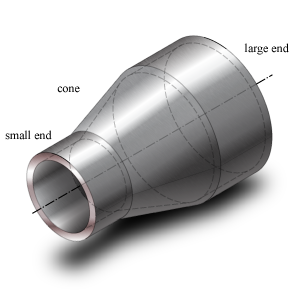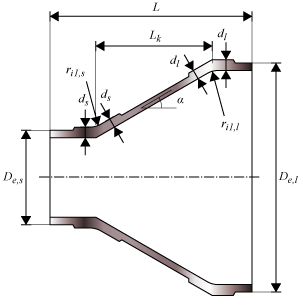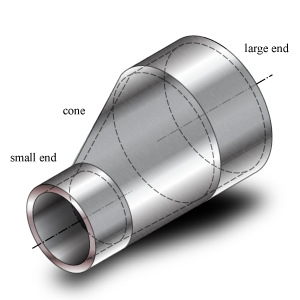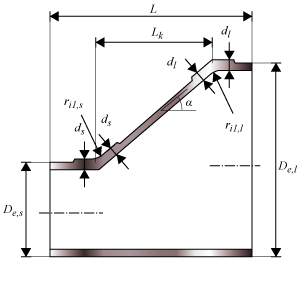Input variables
Generic variables
These variables can be found in virtually all reports as input variables
- Design Pressure – Pd
- Pressure assumed to be present in the component according to the design terms
- Design Temperature – Td
- Temperature assumed to be present in the component according to the design terms
- Material cone, knuckle
- Name of selected material used for the construction of the component
Specific variables
These variables are component specific
- Large/Small
- Large and Small refer to the large pipe end and the smaller (reduced) pipe end respectively
- Outside Diameter – De (Large/Small)
- Outside diameter of the attached part. The diameter runs from the outside of the wall to the opposite outside of the wall, through the center of the circle.
- Nominal Thickness cone, knuckle – dn (Large/Small)
- Thickness ‘as is’, meaning it is the design thickness taking into account corrosion and tolerance.
- Nominal inside or outside knuckle radius – ri1n (Large/Small)
- Nominal inside radius (at large end) or outside radius (at small end) of the knuckle.
- Corrosion – Ca
- Amount of thickness that accounts for the possible effects of corrosions.
- Tolerance – tol (Large/Small)
- Tolerance in thickness for production
- Strength reduction coefficient – z
- Effectiveness of the strength, depending on whether joints are seamless, welded, or expected to perform worse than the base material properties
- Overall length – L
- Length of the entire reducer
- Length conical part – Lk
- Length of the part that reduces gradually in diameter and hence, forms a conical shape
- Angle cone – α
- The angle of the conical section, or the slope with which the diameter reduces.

Concentric reducer

Concentric reducer dimensions

Eccentric reducer

Eccentric reducer dimensions
Calculated Values
- Allowable Stress knuckle at Temperature – f
- Stress in the component at which it is still allowed (without failure) to use the component
- Allowable stress knuckle at 20 °C – ft
- Stress in the component at which it is still allowed (without failure) to use the component at 20 °C ambient temperature
- Allowable Stress cone at Temperature – f2
- Stress in the component at which it is still allowed (without failure) to use the component
- Allowable stress cone at 20 °C – f2t
- Stress in the component at which it is still allowed (without failure) to use the component at 20 °C ambient temperature
- Corrected allowable Stress at temperature knuckle – fe
- Stress in the component at which it is still allowed (without failure) to use the component
- Corrected allowable stress at 20 °C knuckle – fet
- Stress in the component at which it is still allowed (without failure) to use the component at 20 °C ambient temperature
- Dish radius – ri2
- …
- Maximum thickness for cone and knuckle – dmax
- This code determines for cone and knuckle a maximum thickness.
- Nominal Required Thickness cone, knuckle – drn, drn (Large/Small)
- Based on the input, this is the calculated thickness that is required to sustain the loads. The nominal value should be smaller than the nominal design thickness.
- Maximum Allowable Working Pressure – MAWP
- The maximum pressure at which the component can be used in operation. This value should be larger than the design pressure.
- Design margin – Pd / MAWP
- Ratio of the design pressure to MAWP
- Maximum Allowable Test Pressure – MATP
- The maximum pressure at which the component should be tested and survive.
Scope errors
- Design temperature material is out of scope.
- The material properties are not available at the design temperature.
- Cone thickness at large end is out of scope: required d ≤ 0.3 Di / Cos(α)
- This code determines for cones a maximum thickness.
- Knuckle radius at large end is out of scope, required ri1 ≥ (De-2d)/(2 + 38 Cos(α)
- This code determines a minimum radius.
- Knuckle radius at large end is out of scope, required ri1 ≤ (De-2d)/(2 + 4.67 Cos(α)
- This code determines a maximum radius.
Errors
- Can’t find material ‘MaterialName’ in database
- Material could not be found in database. Select an existing material name, or select another material via the material selection window.
- Insufficient knuckle thickness.
- Wall thickness is insufficient to bear the applied loads. Increase the wall thickness.
- Insufficient cone thickness at large junction.
- Wall thickness is insufficient to bear the applied loads. Increase the wall thickness.
- Insufficient cone thickness at small junction.
- Wall thickness is insufficient to bear the applied loads. Increase the wall thickness.
